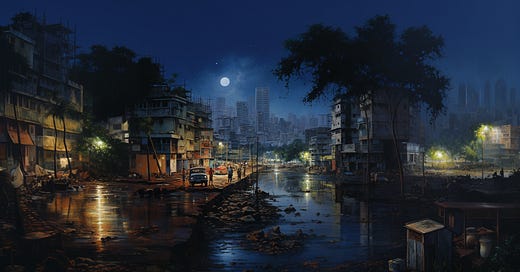The city is a hothouse of myth, especially the large metropolises that dominate the culture and media industries. Mumbai been depicted on screen and print countless times. But when we descend from the mountain of myth into the valley of fact, whom do we consult?
Is it the architect and the builder? Or the councilor and the businessman? Take your pick. But it's unlikely the philosopher is on your journey towards urban enlightenment. You might think that’s perfectly fine, for we don't consult urban planners on matters of human rights or the basic constituents of reality, but philosophy is an imperial discipline that wants to be paid respect everywhere and by everyone.
We are like that only.
Meanwhile, a devil is whispering in my ear: not all philosophers. Don't forget Walter Benjamin1, he says, whose incomplete Arcades Project2 is a meditation on all things Paris. Or Nisargadatta Maharaj3, spreading enlightenment from his Mumbai flat. It's possible for philosophy to illuminate the urban condition.
They were both flaneurs in their own manner
Does the flaneur-philosopher have a perspective missing in the expert sciences? There's the philosophy of architecture, but that can never replace architecture itself? We inhabit buildings while we can never inhabit words about buildings. And, philosophy, famously, is a game of words.
Here's a solution: philosophers should produce spaces (along with the words they can't stop producing). It's not a new thought, to be honest. In fact, it's a very old thought. Socrates didn't produce words on paper. He was ambivalent about writing. His work - if we might call it that - was done in the open, by accosting people in the courtyard and the market and pestering them until they accepted defeat or conspired to kill him (newsflash: they succeeded). In our word obsessed age, we reduce the Socratic dialog to words. Which is absurd: it's as if we reduced a theatrical production or a movie to its script. The words are important, but they take place in a ‘place’: the stage, the set, the screen.
What will philosophy look like if it embraced its latent spatiality? Is there a special kind of space that's unique to philosophy?
The second part of the question is easier to answer than the first, for it goes back to one of the most famous Socratic maxims: I know that I don't know. We can’t quite tell what that maxim might have meant to his contemporaries, but we can steal it for our purposes, for it’s a good diagnostic for distinguishing the expert mind from that of the flaneur. Expert knowledge is of the kind: I know that I know, but flaneur-philosophy can take the lead in creating spaces in which it's acceptable, even encouraged, to say: I don't know.
Not knowing suits the city well, for what is a city at its heart: a mingling of strangers. It's the place where we don't know our neighbours and that's OK. And not only the people, we don't know the buildings, we don't know the roads, the infrastructure... the list goes on and on. The city is hidden. That's why it is possible to be lost in a city in the best sense of that term. The city is a mesh of unfamiliar places, that can nevertheless give us a feeling of belonging.
Meanwhile, an un-Socratic approach to urban affairs is on the ascendant: the ‘Smart City’. Smart Cities use technology and data to render a city transparent to the authorities, who, after all, are in the business of control. That's neither possible, at least not with the technologies we have at hand, though the rhetoric is great for the bottom lines of IT companies, nor desirable. The Smart City is one of various imaginations of a technological Brave New World4, with smart phones replacing drugs as the mechanism of control. Wise cities should be designed for not-knowing, for surprising encounters with the strange and the beautiful.
The German philosopher Edmund Husserl5 made an important distinction between the ‘natural attitude’ and the ‘phenomenological attitude.’ The natural attitude is what we have most of the time - we are immersed in the affairs of the world and (typically) want to twist it to our advantage. The expert has a refined natural attitude - they are still immersed in the world but they bring new tools and concepts to the manipulation of that world.
The phenomenological attitude asks that we set aside our immersion in the world - either as a layperson or as an expert - and focus on our experience as its unfolding. For example, suppose you are a fast bowler running in to bowl the first ball of the match. In the natural attitude, you would be focused on the ball you’re about to bowl, on what it would take to get the batsman out. You’re there to get things done.
In the phenomenological attitude, you would metaphorically step back from your intentions of getting a wicket and pay attention to how the ball feels in your hand and the wind in your hair as you run in, how the batsman is standing and the wicketkeeper is crouching and so on. This attitude is also a form of expertise, but more like that of a dancer than a regular athlete. It might even make you a better bowler, for you can bring that bodily awareness to your game. The flaneur-philosopher takes that awareness one step further, for they are interested in more than experience.
More about that in future Messengers, but here’s a glimpse of what the FP might be able to do. From the opening words from Peter Brook's "The Empty Space6:"
I CAN take any empty space and call it a bare stage. A man walks across this empty space whilst someone else is watching him, and this is all that is needed for an act of theatre to be engaged..
The flaneur walks the city as a stage7 for the bare stage is as inviting to the philosopher as it is to the director. It's time we created a few that cater to our needs.
Spaces of knowing/not-knowing are our contribution to the urban imagination.
https://en.wikipedia.org/wiki/Walter_Benjamin
https://en.wikipedia.org/wiki/Arcades_Project
https://en.wikipedia.org/wiki/Nisargadatta_Maharaj
https://en.wikipedia.org/wiki/Brave_New_World
https://en.wikipedia.org/wiki/Edmund_Husserl
https://en.wikipedia.org/wiki/The_Empty_Space
“All the world's a stage,
And all the men and women merely Players;
They have their exits and their entrances,
And one man in his time plays many parts” — William Shakespeare, As You Like It.











